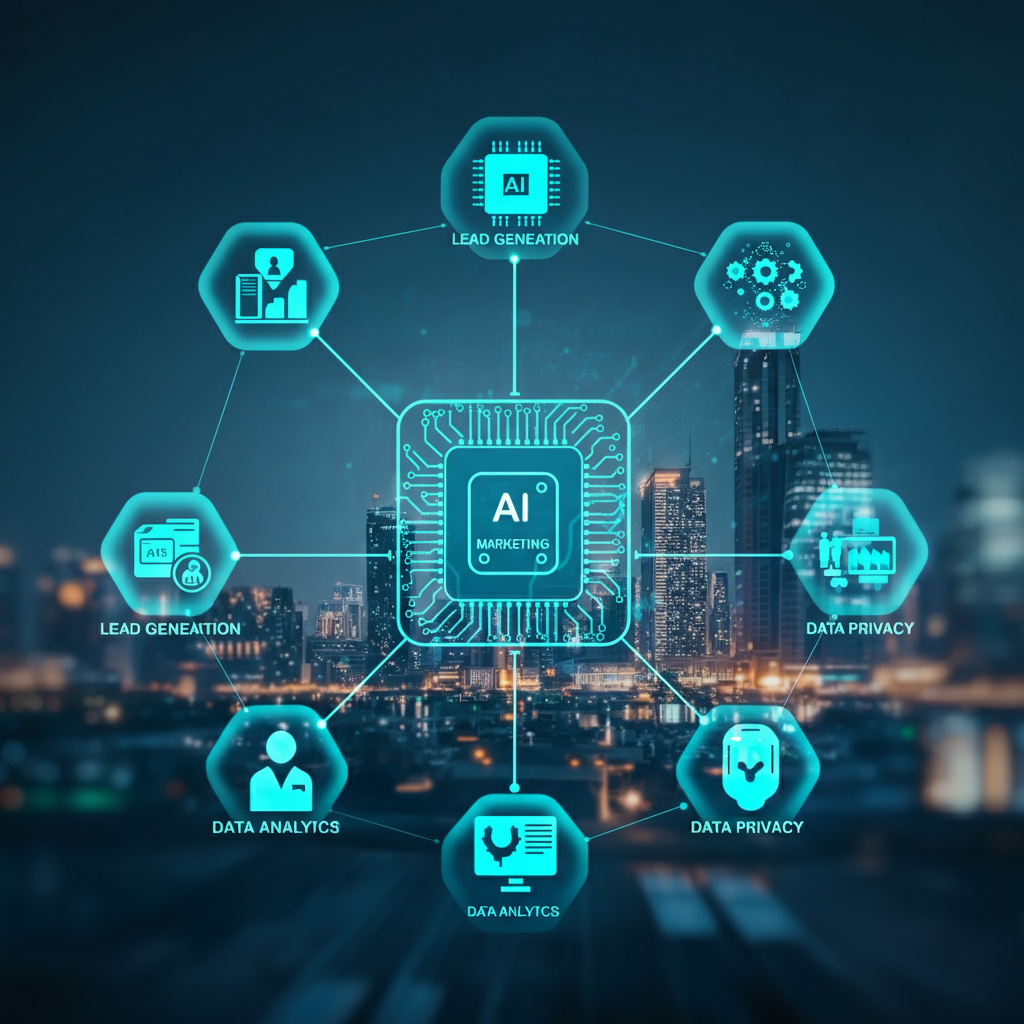Harnessing AI for Transformative Marketing: Strategies, Tools, and Best Practices
- The Rise of AI in Marketing: Transforming Customer Engagement
- Key Concepts in AI Marketing: Tools and Techniques
- Case Studies: Real-World Success with AI Marketing
- Crafting an Effective AI Marketing Strategy
- Top AI Marketing Tools and Software for Efficiency
- Exploring the Benefits and Challenges of AI in Marketing
- Essential Use Cases and Best Practices for AI Marketing
The Rise of AI in Marketing: Transforming Customer Engagement
Artificial intelligence (AI) is reshaping the marketing landscape, revolutionizing how businesses engage with their customers. By leveraging machine learning, AI can analyze vast amounts of data to uncover insights that were once inaccessible. This technology enables marketers to deliver personalized experiences on a massive scale, tailoring interactions to individual preferences and behaviors.
One of the most significant impacts of AI in marketing is its ability to boost sales velocity and revenue while minimizing market waste. By understanding customer behaviors and preferences, AI-driven marketing strategies can target the right audience with precision, increasing the likelihood of conversion and customer retention.
Moreover, AI automates repetitive tasks such as data entry, email responses, and customer service inquiries, freeing up valuable time for marketing professionals to focus on strategic initiatives. This operational efficiency is crucial for businesses looking to stay competitive in today's fast-paced market environment. As AI continues to evolve, its role in transforming customer engagement will only grow, providing marketers with powerful tools to connect with their audiences more effectively than ever before.

Key Concepts in AI Marketing: Tools and Techniques
At the core of AI marketing lies the utilization of machine learning algorithms to analyze data and engage customers in meaningful ways. This technology allows marketers to offer personalized experiences at an unprecedented scale, tailoring content, recommendations, and interactions to suit individual preferences.
One of the primary advantages of AI in marketing is its capacity to automate repetitive tasks. Tools like AI chatbots and email assistants streamline communication, ensuring prompt and efficient responses to customer inquiries. These automated solutions not only enhance customer satisfaction but also improve operational efficiency.
A noteworthy example of AI's capabilities is Revenue AI, a platform that empowers B2B marketers to identify and prioritize accounts ready to buy. By automating personalized campaigns and optimizing marketing efforts, Revenue AI maximizes the return on investment (ROI) and drives growth.
Ultimately, AI's ability to harness data for personalized engagement, coupled with its automation capabilities, makes it an indispensable tool in modern marketing strategies. By leveraging these technologies, marketers can deliver tailored experiences that resonate with their audiences, fostering stronger connections and driving business success.

Case Studies: Real-World Success with AI Marketing
Real-world examples highlight the transformative impact of AI in marketing. Take Lily AI, for instance. By leveraging AI for customer engagement and data enrichment, Lily AI has achieved remarkable success in go-to-market strategies and opportunity conversion. This demonstrates how AI can be a powerful tool for driving business growth.
Marathon Health offers another compelling case study. By adopting an omnichannel approach enriched with AI insights, the company experienced substantial pipeline growth and enhanced market engagement. This underscores the potential of AI to deliver valuable insights that can steer marketing strategies toward success.
Khoros, meanwhile, integrated AI for personalized website experiences, leading to impressive conversion rates and visitor engagement. Such results highlight the ability of AI to create tailored experiences that resonate with users, ultimately driving higher conversion rates.
Code42 leveraged AI to identify accounts and personalize marketing efforts, resulting in increased opportunity volume and deal size. Similarly, Automox implemented AI for targeted marketing and sales alignment, witnessing notable increases in closed-won deals and opportunities.
These case studies illustrate the diverse ways in which AI can be applied to achieve marketing success. By harnessing the power of AI, businesses can unlock new opportunities for growth and enhance their engagement with customers.

Crafting an Effective AI Marketing Strategy
Developing a robust AI marketing strategy requires careful planning and execution. The first step is to define clear objectives, such as lead generation or boosting sales. Having well-defined goals helps guide the strategic use of AI technologies in achieving desired outcomes.
Collecting and analyzing accurate data is crucial for gaining insights into customer behavior and preferences. By understanding these patterns, marketers can tailor their strategies to meet the needs of their target audience effectively. AI plays a pivotal role in processing large datasets to uncover valuable insights that inform decision-making.
Audience segmentation and personalized messaging are essential components of an effective AI-driven marketing strategy. By leveraging AI algorithms, marketers can segment audiences based on various criteria and deliver tailored content that resonates with each segment.
Automation is another key aspect of AI marketing strategies. Implementing AI-driven automation streamlines workflows, reduces manual tasks, and enhances overall efficiency. This allows marketing teams to focus on strategic initiatives that drive growth.
Finally, monitoring metrics such as conversion rates and ROI is vital for assessing the effectiveness of AI marketing efforts. By continuously evaluating these metrics, marketers can refine their strategies and optimize outcomes, ensuring sustained success in a competitive market landscape.

Top AI Marketing Tools and Software for Efficiency
In the rapidly evolving field of AI marketing, numerous tools and software have emerged to enhance efficiency and effectiveness. Among the most popular are Alyce, Bombora, Clari, and Drift, each offering unique capabilities that cater to various marketing needs.
Alyce, for instance, focuses on personalized gifting, enabling marketers to engage with prospects meaningfully. Bombora, on the other hand, provides intent data that helps businesses understand their audience's interests and tailor marketing strategies accordingly.
Clari is renowned for its automation capabilities, streamlining processes and improving operational efficiency. This tool empowers marketing teams to focus on high-impact tasks, driving better results.
Drift specializes in conversational marketing, using AI-powered chatbots to engage with website visitors in real time. This enhances customer experience and increases the likelihood of conversion by providing immediate assistance and information.
Integration with customer relationship management (CRM) systems is a significant advantage of these tools, ensuring seamless operations and a holistic view of customer interactions. By leveraging these AI marketing tools, businesses can improve efficiency, enhance customer engagement, and make data-driven decisions that drive success.

Exploring the Benefits and Challenges of AI in Marketing
AI offers a multitude of benefits in the marketing realm, revolutionizing how businesses interact with their customers. One of the primary advantages is enhanced lead generation, where AI algorithms identify potential customers and tailor marketing efforts to engage them effectively. This targeted approach not only boosts conversion rates but also improves overall marketing efficiency.
Personalization is another significant benefit of AI in marketing. By analyzing customer data, AI systems can deliver personalized content and recommendations, enhancing the customer experience and fostering brand loyalty. Additionally, AI's advanced data analytics capabilities provide real-time insights that inform strategic decision-making, allowing businesses to stay ahead of market trends.
However, the adoption of AI in marketing also presents challenges. Data privacy concerns are paramount, as the collection and use of personal information must comply with regulations to protect consumer rights. Initial setup costs and the risk of algorithmic bias are other considerations businesses must address when implementing AI solutions.
Furthermore, AI's dependency on accurate data highlights the importance of data integrity and quality. Inaccurate or incomplete data can lead to misguided strategies and ineffective outcomes. Lastly, there are concerns about potential job displacement as AI automates tasks traditionally performed by humans.
Balancing the benefits and challenges of AI in marketing requires a thoughtful approach, ensuring that businesses leverage technology responsibly while maximizing its transformative potential.

Essential Use Cases and Best Practices for AI Marketing
AI has become an indispensable tool in various marketing use cases, driving efficiency and effectiveness across multiple channels. Automated lead generation and targeted advertising are prime examples, where AI identifies and engages potential customers with precision, increasing conversion rates and driving revenue growth.
Personalized content recommendations and chatbots are another essential use case of AI in marketing. By analyzing user behavior and preferences, AI systems can suggest relevant content and offer real-time assistance through chatbots, enhancing customer satisfaction and engagement.
Predictive analytics is a powerful application of AI, enabling marketers to optimize email campaigns by predicting user behavior and tailoring messages accordingly. This data-driven approach improves open rates and click-through rates, maximizing the impact of email marketing efforts.
Customer journey analysis and social media monitoring are further areas where AI plays a critical role. By tracking interactions and sentiment across different touchpoints, AI provides valuable insights into customer preferences and behaviors, informing marketing strategies and enhancing overall brand experience.
To harness the full potential of AI in marketing, businesses must adhere to best practices. Staying informed about privacy regulations and implementing robust data protection measures are essential to safeguard consumer rights and build trust. Embracing data minimization and anonymization further ensures compliance and ethical use of AI technologies, paving the way for successful and responsible AI marketing initiatives.